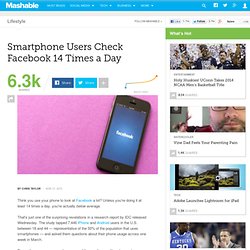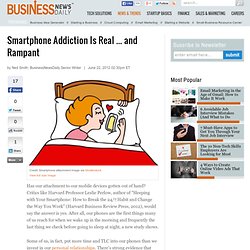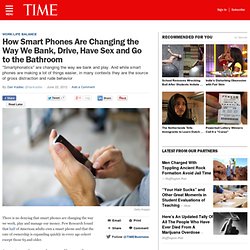

New Harvard Study Shows Why Social Media Is So Addictive for Many. Enewsletter Archive | Social Media | SEO.

Smartphone Users Check Facebook 14 Times a Day. Think you use your phone to look at Facebook a lot?

Unless you're doing it at least 14 times a day, you're actually below average. That's just one of the surprising revelations in a research report by IDC released Wednesday. The study tapped 7,446 iPhone and Android users in the U.S. between 18 and 44 — representative of the 50% of the population that uses smartphones — and asked them questions about their phone usage across one week in March. Depending on your perspective, many of the results are either depressing or confirm what you knew all along. For example, it seems that 79% of smartphone users reach for their devices within 15 minutes of waking up. Given that the survey was sponsored by Facebook, most of the questions focus on the social network. Peak Facebook time is during the evening, just before bed.
Afraid of Losing Your Phone? You May Have Nomophobia Like Half the Population. If you know the panicked and disconnected feeling of leaving your mobile phone at home, you might be one of the many suffering from nomophobia.

A recent survey by U.K. -based mobile security service provider SecurEnvoy conducted among 1,000 people found that two thirds (66%) of respondents fear losing or being without their mobile phone — a fear called nomophobia. The phobia also includes the anxiety someone feels when not in the range of a cell tower to receive optimal reception. The Phone That Wasn't There: 11 Facts About Phantom Vibrations. No, "Phantom Vibrations" are not a terrible "Beach Boys Meet the Munsters Cover Tribute Band.

" Alexis Madrigal and Robinson Meyer You're sitting at work. Your phone vibrates in your pocket. As you reach for it, you look up... and see your phone, sitting on the table. You just experienced a phantom vibration. A new study was released this week on the phenomenon. 1. 2. 3. 4. Smartphone Addiction Is Real ... and Rampant. Has our attachment to our mobile devices gotten out of hand?

Critics like Harvard Professor Leslie Perlow, author of "Sleeping with Your Smartphone: How to Break the 24/7 Habit and Change the Way You Work" (Harvard Business Review Press, 2012), would say the answer is yes. After all, our phones are the first things many of us reach for when we wake up in the morning and frequently the last thing we check before going to sleep at night, a new study shows. Some of us, in fact, put more time and TLC into our phones than we invest in our personal relationships. How Severe Is Our Screen Addiction? For many people, staring at screens is a simple daily occurrence: our jobs require use of a computer and many of us have smartphones that connect to the Internet.

We often stop focusing on one screen just long enough to turn our attention to another. But how much time do we really spend with our eyes transfixed on a digital display? According to this infographic from PGi, most people spend five hours on their computer or laptop each day, which is a noticeable upswing since 2010 when the average was three hours. The typical person also spends four hours watching television and just over two hours on their smartphone or tablet. Nearly 50% of the time spent on these electronic devices is dedicated to entertainment, such as streaming TV shows and movies or listening to music.
Why Smartphone-Obsessed Generation Y Can't Put Down Their Phones. The smartphone: man's new best friend — at least for Generation Y. Wireless devices have changed the way we communicate, work and entertain ourselves. For many people in Gen Y, the last thing we do before we go to bed is check our smartphones, and it's often the first thing we reach for in the morning. It's basically an extension of ourselves. Cisco's third annual global Connected World Technology Report (CCWTR) focuses on why Generation Y, in particular, can't part from their smartphone devices. SEE ALSO: Managing Millennials: Why Gen Y Will Be Running the Country by 2020 [INFOGRAPHIC] Two out of five said they “would feel anxious, like part of me is missing,” if they couldn’t use their smartphones to stay connected.
The smartphone has replaced our newspaper, radio and PC, so it should come as no surprise that Gen Y-ers prefer smartphones to PCs and even tablets. Mobile Security. How Smart-Phone Obsession Is Changing Our Society. There is no denying that smart phones are changing the way we work, play and manage our money.

Pew Research found that half of American adults own a smart phone and that the rate of ownership is expanding quickly in every age cohort except those 65 and older. A new category of consumer has emerged known as the “smartphonatic,” defined as someone who changes shopping, banking and payment behavior after switching to a smart phone. Globally, a quarter of smart-phone owners are considered smartphonatics, according to a study by ACI Worldwide and Aite Group. Among this group, 80% use their phone for mobile banking, and 70% use it for mobile payments.